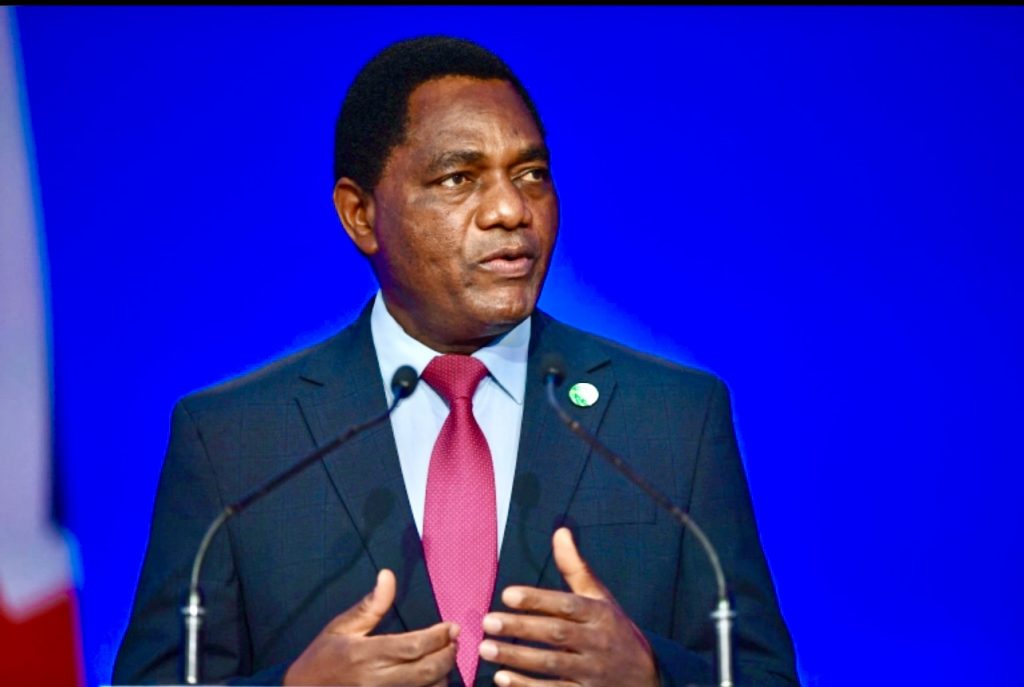Head of state in Africa’s red metal hot spot Zambia, Hakainde Hichilema challenged global leaders to roll out homogenous standards for carbon credits in the adaptation and mitigation of climate risks. This was Hichilema’s third active climate change platform since his ascension to power in August 2021. The first was his debut United Nations General Assembly conference in New York with the second and third being the 26th and 27th UN climate change conferences held in Glasgow and Sharm El Sheikh respectively. Zambia continues to play a pivotal role in the climate change agenda in Africa which as chair of the African group of negotiators, has submitted an ambitious revised and updated position on climate risks bordering on commitments that partners have made at various platforms aligned to the Paris agreement.
“Let us work out a template of implementing carbon credits with a much easier format, including crafting regulations that effect this revenue based activity that helps us ameliorate the negative effects of climate change,” President Hakainde Hichilema said. The concept of carbon credits is gaining global traction and remains an area with immense asymmetries and will require regulators globally to harmonize and drive awareness so as to allow for cross border trading. It is evident that very few carbon trading markets exist.
“Africa is a continent bearing a significant portion of the brunt of climate change but yet contributes the least to climate damage,” Hichilema said in his eight minute speech at the COP27 in Sharm El Sheikh, Egypt. Global leaders have gathered in an Egyptian resort town between the desert of the Sinai Peninsula and the Red Sea to recommit to initiatives that will save the planet with nature based solutions and other interventions. The vice is a global emergency requiring urgent intervention or else the world stands to lose gross domestic product of about 10% or $23 trillion by 2050.
During the last climate change conference international partners committed to financing commitments of $100 billion annually which Hichilema in his speech said if not, would then question leaders credibility and could impact execution of obligations to protect future generations and the planet at large.
Zambia despite its resourcing constraints is championing a green growth strategy through a climate smart green economy. Adaption and mitigation remains top priority for nations, a goal taken up in COP26 in Glasgow. It remains factual that Africa and other developing nations are still in infancy of the climate risk resilience journey with immense dependency of fossil fuels by many nations which are key drivers of emissions. For some these nations, fossil fuels are major export revenue earners whose proceeds are used to balance budgets.
Hichilema, the man that has put the red metal producer on the map over the last 1 year with the Washington based lender, the IMF, having approved an extended credit facility of $1.3 billion as the Southern African nation seeks to restore fiscal fitness, created a ministry of green and economy in his debut budget. His Finance Minister Dr. Situmbeko Musokotwane allocated a yard (K1billion) towards climate adaptation initiatives in the 2023 budget while simultaneously announcing green bond listing rules for the local bourse and withholding tax incentives for investors in the green bond market. Being home to green metals namely cobalt, copper and manganese, Hichilema and his Democratic Republic of Congo counterpart Felix Tshisekedi signed an economic memorandum for the production of electric car batteries which will be used to propel electric cars as the world seeks to aggressively decarbonize the world from effects of fossil fuels.
It is becoming more vivid that climate resilience will require more than tree planting but smarter commitments into curbing carbon emissions which business houses should be alive to. Sectors such as energy, mining, manufacturing and power generation remain key drivers of carbon emissions that will only be curbed through reflecting this is risk appetite of financial instructions. Climate ‘green washing’ risks remain very high.
The Kwacha Arbitrageur

